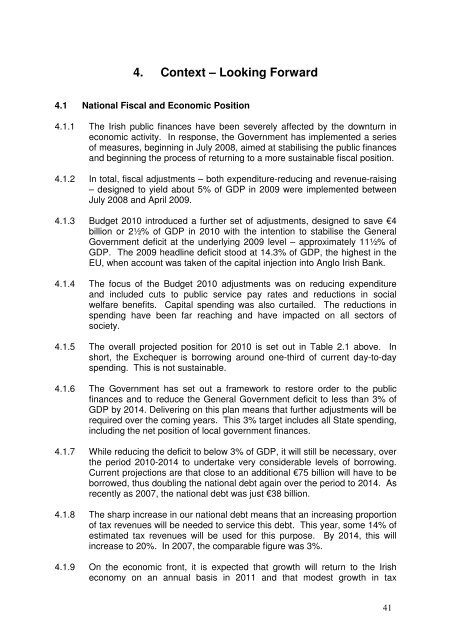Report of the Local Government Efficiency Review Group
Report of the Local Government Efficiency Review Group
Report of the Local Government Efficiency Review Group
You also want an ePaper? Increase the reach of your titles
YUMPU automatically turns print PDFs into web optimized ePapers that Google loves.
4. Context – Looking Forward<br />
4.1 National Fiscal and Economic Position<br />
4.1.1 The Irish public finances have been severely affected by <strong>the</strong> downturn in<br />
economic activity. In response, <strong>the</strong> <strong>Government</strong> has implemented a series<br />
<strong>of</strong> measures, beginning in July 2008, aimed at stabilising <strong>the</strong> public finances<br />
and beginning <strong>the</strong> process <strong>of</strong> returning to a more sustainable fiscal position.<br />
4.1.2 In total, fiscal adjustments – both expenditure-reducing and revenue-raising<br />
– designed to yield about 5% <strong>of</strong> GDP in 2009 were implemented between<br />
July 2008 and April 2009.<br />
4.1.3 Budget 2010 introduced a fur<strong>the</strong>r set <strong>of</strong> adjustments, designed to save €4<br />
billion or 2½% <strong>of</strong> GDP in 2010 with <strong>the</strong> intention to stabilise <strong>the</strong> General<br />
<strong>Government</strong> deficit at <strong>the</strong> underlying 2009 level – approximately 11½% <strong>of</strong><br />
GDP. The 2009 headline deficit stood at 14.3% <strong>of</strong> GDP, <strong>the</strong> highest in <strong>the</strong><br />
EU, when account was taken <strong>of</strong> <strong>the</strong> capital injection into Anglo Irish Bank.<br />
4.1.4 The focus <strong>of</strong> <strong>the</strong> Budget 2010 adjustments was on reducing expenditure<br />
and included cuts to public service pay rates and reductions in social<br />
welfare benefits. Capital spending was also curtailed. The reductions in<br />
spending have been far reaching and have impacted on all sectors <strong>of</strong><br />
society.<br />
4.1.5 The overall projected position for 2010 is set out in Table 2.1 above. In<br />
short, <strong>the</strong> Exchequer is borrowing around one-third <strong>of</strong> current day-to-day<br />
spending. This is not sustainable.<br />
4.1.6 The <strong>Government</strong> has set out a framework to restore order to <strong>the</strong> public<br />
finances and to reduce <strong>the</strong> General <strong>Government</strong> deficit to less than 3% <strong>of</strong><br />
GDP by 2014. Delivering on this plan means that fur<strong>the</strong>r adjustments will be<br />
required over <strong>the</strong> coming years. This 3% target includes all State spending,<br />
including <strong>the</strong> net position <strong>of</strong> local government finances.<br />
4.1.7 While reducing <strong>the</strong> deficit to below 3% <strong>of</strong> GDP, it will still be necessary, over<br />
<strong>the</strong> period 2010-2014 to undertake very considerable levels <strong>of</strong> borrowing.<br />
Current projections are that close to an additional €75 billion will have to be<br />
borrowed, thus doubling <strong>the</strong> national debt again over <strong>the</strong> period to 2014. As<br />
recently as 2007, <strong>the</strong> national debt was just €38 billion.<br />
4.1.8 The sharp increase in our national debt means that an increasing proportion<br />
<strong>of</strong> tax revenues will be needed to service this debt. This year, some 14% <strong>of</strong><br />
estimated tax revenues will be used for this purpose. By 2014, this will<br />
increase to 20%. In 2007, <strong>the</strong> comparable figure was 3%.<br />
4.1.9 On <strong>the</strong> economic front, it is expected that growth will return to <strong>the</strong> Irish<br />
economy on an annual basis in 2011 and that modest growth in tax<br />
41
















